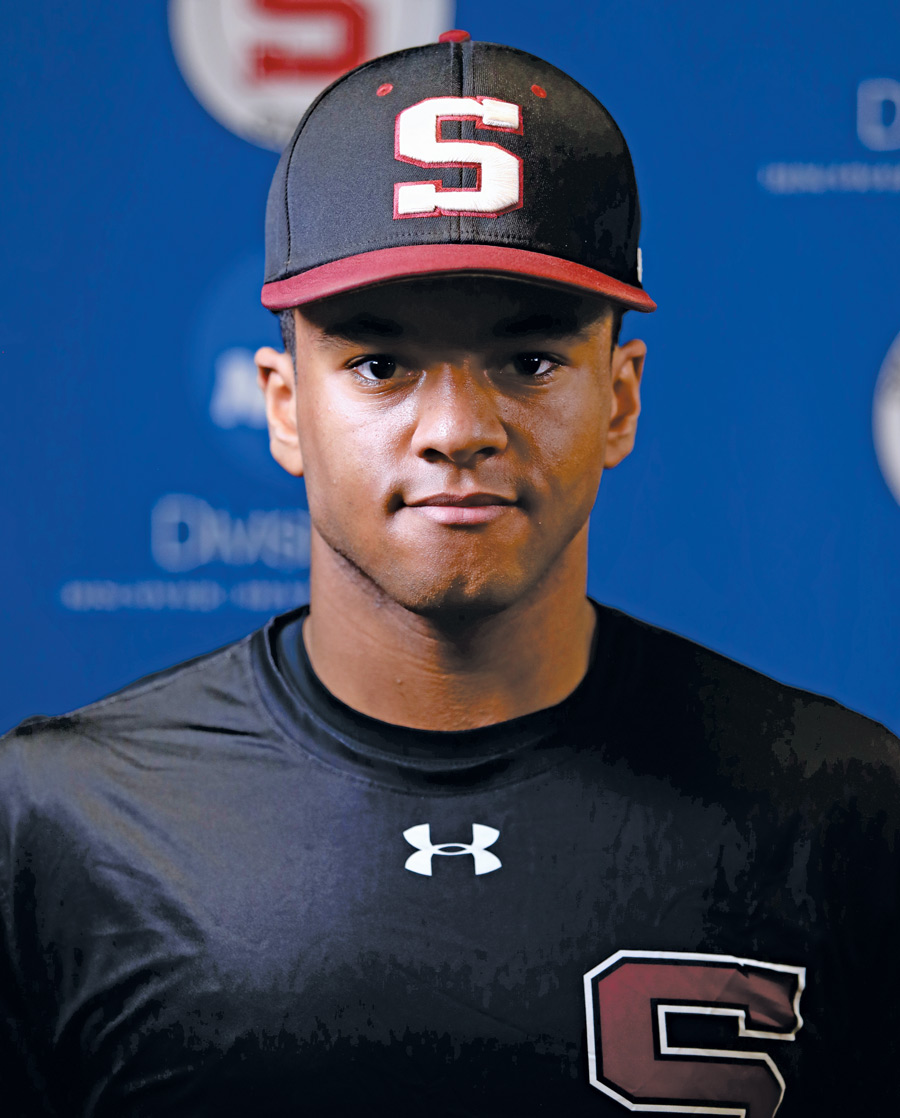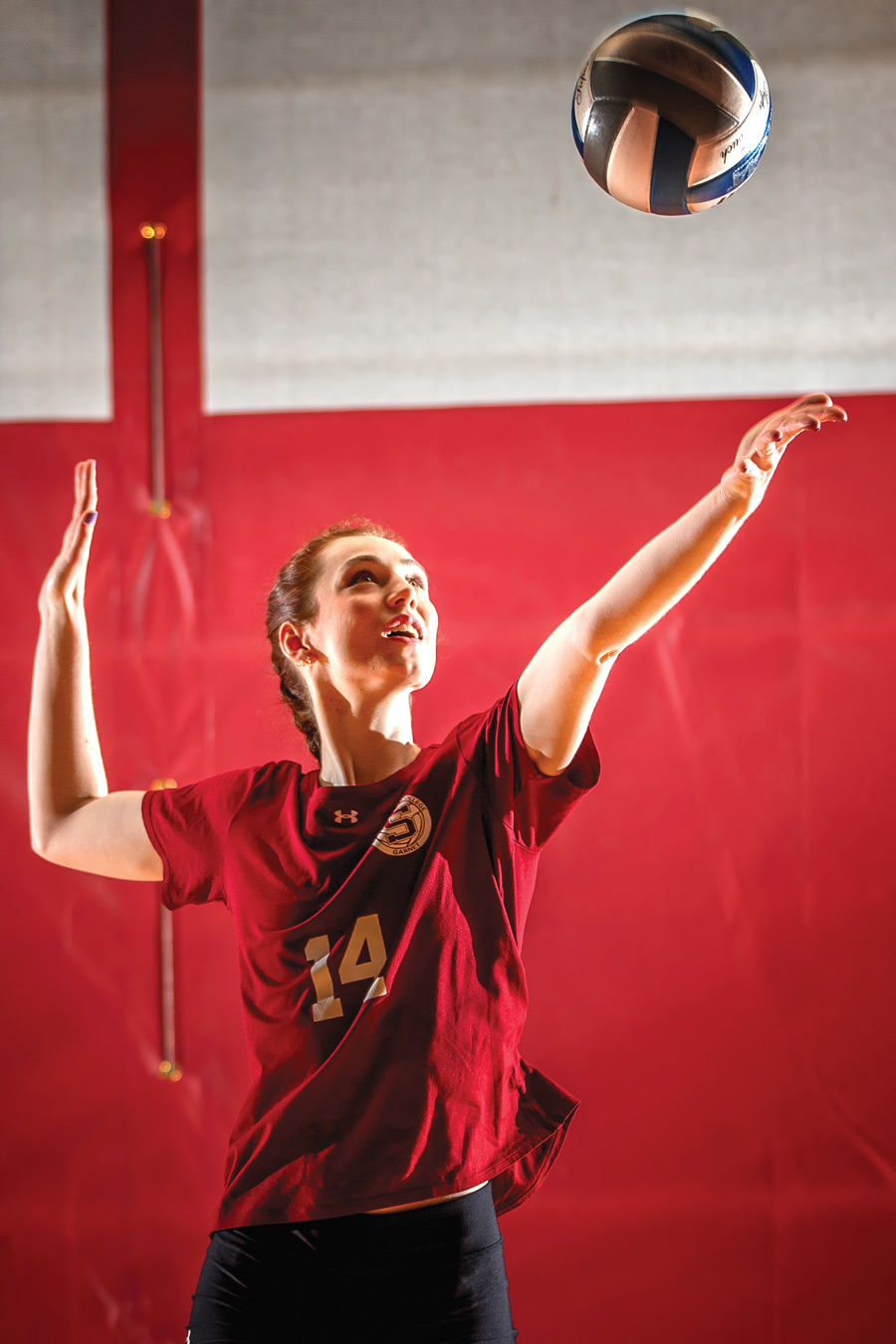Away Games
Just Keep Swimming
“I had a run-in with the sea lions in October, which was very frightening,” says Anna Kottakis ’22. The neuroscience and English double major from Clarence Center, N.Y., has been living in the remote community of Sitka this year as an AmeriCorps volunteer. And the lifelong swimmer hasn’t let wildlife or the 50-degree water temperatures keep her from her favorite pastime.
“The seals are much sweeter, and they’re really curious,” she says. “They’ll swim up next to you just to check you out, which is very off-putting, but you get used to it.”
Kottakis, who won a bronze medal for the Garnet in the 100-yard backstroke at the 2020 Centennial Conference Championships, decided to take a leave of absence this school year after struggling with remote learning last spring. She applied to and was placed with AmeriCorps for a 10-month program in Sitka working at a boarding high school that predominantly serves Alaska Native students.
“It’s been a really humbling experience,” says Kottakis, who leads after-school activities for the recreation department, supervising groups like the creative writing club, the environmental club, and one of several Native dance groups on campus. As she’s learned more about the culture through observing dances and bonding with her students, Kottakis has broadened her horizons.
“It’s taught me not to get too hung up on academics,” says the scholar who has always made academics a priority. In her new community, she’s become aware of all the life skills that she needs to learn: “I still don’t know what to do if a bear approaches me, and I can’t fish.”
“I’ve been swimming since I was 4 years old, so it’s nice to have a little time away to recharge and be reminded why I like it,” she says. “I’ve also learned that it’s healthiest to know how to compartmentalize and when to mentally put something away. I can’t endlessly stress about dual meets or qualifying times; I have to work hard at practice and be a good teammate, and then trust that it’s going to take me where I need to be.”
Thrown a Curveball
Bein, an outfielder from Delmar, N.Y., was 12 games into his Swarthmore baseball career when he received the news that the final game of the Garnet’s spring break trip would be the last time he’d take the field that season. The squad, which was 10-2 overall with wins over nationally ranked teams, was poised to be one of the strongest head coach Matt Midkiff had led in years.
“I was in a much better position than the seniors, but it was tough to see them have their careers end so abruptly,” Bein says. “As athletes, we take a lot of comfort in the fact that we can somewhat control when our careers are over, so it’s jarring, to say the least.”
Since then, Bein has been doing all he can to stay in shape — from sending Snapchat videos of himself practicing his swing to his teammates, to traveling to Myrtle Beach, S.C., for a month to participate in the Beach Collegiate Baseball League with Zach Camp ’22 and Cole Hebble ’21.
When the time comes to don a Swarthmore uniform again, he wants to be as prepared as possible.

Bein, who plans to play collegiately after graduation with additional eligibility granted by the NCAA, has learned from the experience that he can’t take for granted the time spent with his “brotherhood” of teammates.
“I wish that I could have told myself a year ago that the season was going to end soon and I wouldn’t see some people for a while,” he says. “Going forward, I have to cherish the few opportunities that I do have and realize that nothing is guaranteed.”
Abroad, and then Suddenly Back
Instead, Thrasher was forced to return to the United States early and to juggle summer opportunities with the Swiss academic calendar. Though she was able to secure housing on campus in the fall to conduct thesis research on plant responses to stress, the middle blocker found herself practicing volleyball for the first time without Nathan by her side. She felt isolated, likening Swarthmore to the Upside Down from Stranger Things: a place that is both intimately familiar yet uncanny in its emptiness.
Rather than dwelling on what was different, Thrasher saw her sport as an outlet — and a chance to mentor younger student-athletes and escape from the chaos of the outside world.
Despite the added challenge of having to wear a mask during practices interrupted by periodic sanitizing breaks, volleyball was a constant, an anchor in the Upside Down.

Thrasher had been offered a Fulbright but decided instead to accept “a really amazing job at the Children’s Hospital of Philadelphia to work in an epigenetics lab.” In the meantime, she is not mourning the loss of her final collegiate season. As a walk-on who didn’t intend to compete in college, she hoped to have a career as “the happiest benchwarmer” in the NCAA.
“Whenever I’d get really stressed out during the season or so sore that I couldn’t walk,” she says, “I’d always remind myself, every minute I got on the court is one more than I thought I was going to have in my life.”